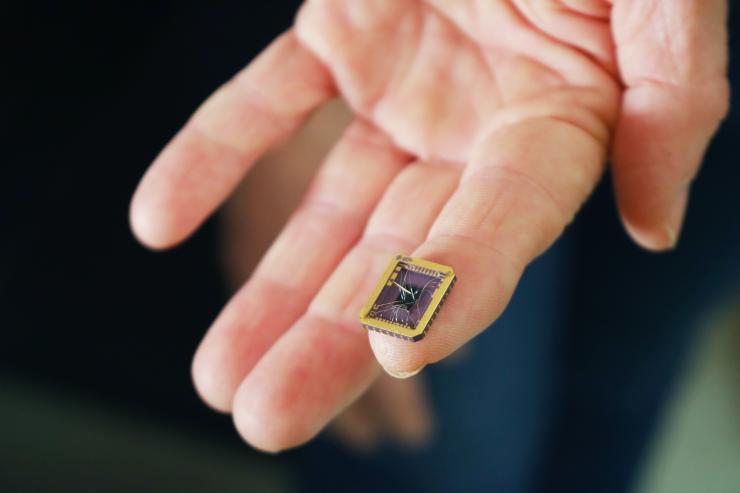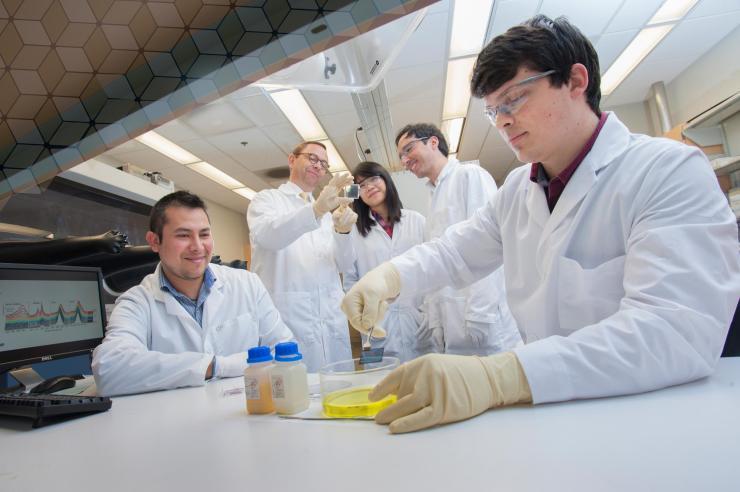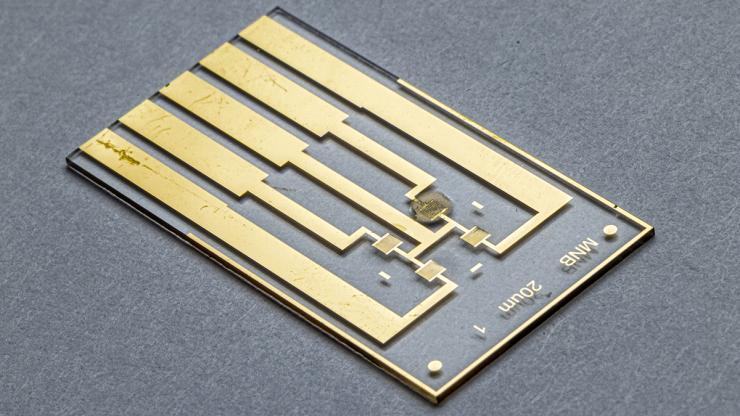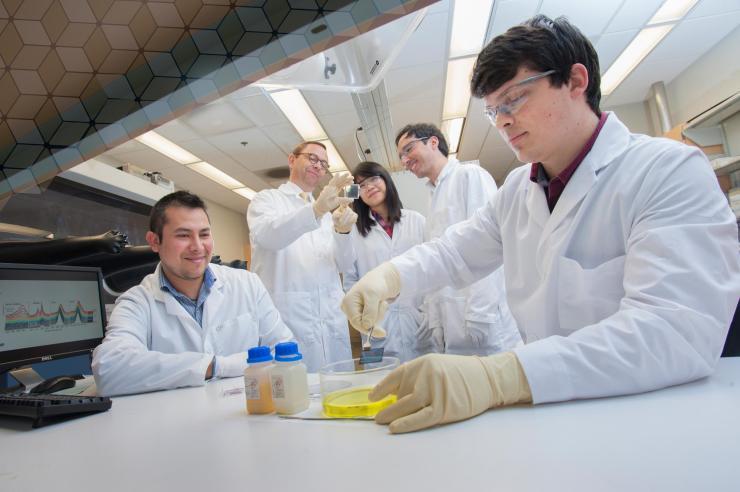Explore the latest developments in microelectronics and semiconductors with leading researchers and industry professionals
Tuesday, May 2, 2023
8:00 a.m. - 6:30 p.m.
Marcus Nanotechnology Building
Rooms 1116-1118
Join us for an in-depth one-day workshop at Georgia Tech, focusing on the latest research and trends in microelectronics and semiconductors. This interactive event will offer an opportunity to learn from and network with experts, academics, and professionals from across the field. The day will include:
- A Keynote by Gregg Bartlett, CTO of GlobalFoundries: Acquire a deeper understanding of the current state and future directions in microelectronics and semiconductors from a globally recognized expert.
- A Dedication to John Hooper: Recognizing the contributions of the founding director of the original Georgia Tech Microelectronics Research Center, whose impact on Georgia Tech and the broader microelectronics community can still be felt today.
- "Tech Challenge" Talks: Learn about key technical challenges in microelectronics and semiconductors from industry leaders and Georgia Tech faculty members.
- Industry Panels on Heterogeneous Integration and Workforce Development: Learn from thought leaders as they discuss strategies for fostering innovation and cultivating talent in the rapidly evolving microelectronics sector.
- A Student Poster Session: Explore the research of Georgia Tech's emerging scientists and engineers and learn about the innovations that will shape the future of microelectronics.
- A Vendor Showcase: Discover the latest products and solutions from top companies driving advancements in semiconductors and microelectronics.
- Networking Opportunities: Connect with fellow researchers, academics, and professionals in the microelectronics and semiconductor fields.
This workshop is designed to facilitate knowledge exchange, provide valuable insights, and offer resources to help you excel in this rapidly changing field. Mark your calendars for this not-to-be-missed event!
Registration
Registration is closed.
Tentative Agenda*
| 7:45 am - 8:20 a.m. | Registration and Breakfast |
| 8:20 a.m. - 8:35 a.m. | Welcome and Introductions Michael Filler | Associate Director for Research Programs, Institute for Electronics and Nanotechnology George White | Director, Strategic Research Partnerships, Georgia Tech |
| 8:35 a.m. - 9:20 a.m. | Keynote Address Gregg Bartlett | CTO, GlobalFoundries |
| 9:20 a.m. - 9:50 a.m. | Dedication to John Hooper David Hertling | Professor Emeritus, Georgia Tech Roger Webb | Professor Emeritus, Georgia Tech |
| 9:50 a.m. - 10:05 a.m. | Talk Title TBD Fayrouz Saad | Director of Public Engagement for the CHIPS Program Office |
| 10:05 a.m. - 10:25 a.m. | Coffee Break |
| 10:25 a.m. - 10:45 a.m. | Semiconductor Capabilities and Workforce Development Opportunities Rick McCormick | Advanced Semiconductor Technology Sr. Manager, Sandia National Laboratories |
| 10:45 a.m. - 11:35 a.m. | Economic Development Panel (Moderator: Greg King) Kristi Brigman | Deputy Commissioner for Global Commerce, Georgia Department of Economic Development Steve Ferguson | CIO, Technical College System of Georgia Serra P. Hall | Executive Director, Newton County Industrial Development Authority |
| 11:35 a.m. - 11:45 a.m. | Chaouki Abdallah | Executive Vice President for Research, Georgia Tech |
| 11:45 a.m. - 12:45 p.m. | Lunch |
| 12:45 p.m. - 1:05 p.m. | Plenty of Room at the Top and Bottom Suman Datta | Professor, Georgia Tech Asif Khan | Assistant Professor, Georgia Tech |
| 1:05 p.m. - 1:25 p.m. | Microelectronic and Advanced Packaging Technologies (MAPT) Roadmap Victor Zhirnov | Chief Scientist, Semiconductor Research Corporation |
| 1:25 p.m. - 1:40 p.m. | Intro to Georgia Tech Facilities for Next Generation Microelectronics R&D Gary Spinner, IEN Director of Research Operations, Georgia Tech |
| 1:40 p.m. - 2:00 p.m. | Building Millimeter Wave Digital Arrays with 2.5D and 3DHI Packaging Jason Milne | Engineering Fellow & Program Manager, Raytheon Intelligence & Space |
| 2:00 p.m. - 3:00 p.m. | Student Poster Session |
| 3:00 p.m. - 3:20 p.m. | A DARPA Perspective on Next Generation Electronic Design Automation Sung-Kyu Lim | Professor, Georgia Tech and Program Manager, DARPA |
| 3:20 p.m. - 3:35 p.m. | Joint University Microelectronics Program (JUMP) 2.0 Update Arijit Raychowdhury | Professor and Steve W. Chaddick School Chair, Georgia Tech |
| 3:35 p.m. - 4:20 p.m. | Workforce Development Panel (Moderator: Mikkel Thomas) Branden Brough | Director, National Nanotechnology Coordination Office Brian English | Owner/CTO, EngeniusMicro Tavarez Holston | President, Georgia Piedmont Technical College Azad Naeemi | Professor, Georgia Tech Hua Zheng | Senior Director, DRAM Engineering Group, Micron |
| 4:20 p.m. - 4:40 p.m. | CHIPs Act and Intellectual Property Considerations Paul Tanpitukpongse | Principal, Meunier Carlin & Curfman IP Law Anthony Zucchero | Senior Patent Agent, Meunier Carlin & Curfman IP Law |
| 4:40 p.m. - 5:00 p.m. | Innovating for the Future: Heterogeneous Integration at a Wafer Level Ian Melville | Director, GlobalFoundries |
| 5:00 p.m. - 6:30 p.m. | Concluding Remarks, Hors d' oeuvres, and Networking |
* Subject to change
Directions and Parking
Address:
Marcus Nanotechnology Building
345 Ferst Drive
Atlanta, GA 30332
Visitor parking is available in lot W23. View the Georgia Tech Visitor Parking page to learn more.
Local Hotels


Keynote Speaker
Gregg Bartlett, Chief Technology Officer, GlobalFoundries
Gregg Bartlett is chief technology officer for GF, a position he was appointed to in 2022. He leads the execution and delivery of the company’s differentiated technology roadmap, including partnering with key universities and institutions to drive innovation, and accelerating development and delivery of GF’s differentiated technology. Bartlett oversees technology development, design enablement, GF Labs and global reliability and technology solutions.
Prior to his current role, Bartlett was senior vice president of technology, engineering and quality at GF from 2019 to 2022. Before that, he served in various senior executive roles at GF including head of technology development, chief technology officer and head of the CMOS (complementary metal-oxide-semiconductor) business from 2009 to 2019. Before joining GF, Bartlett spent 25 years in technical and management positions at Freescale Semiconductor and its predecessor, Semiconductor Products Sector at Motorola. Bartlett currently serves as a member of the board directors of Carbice Corporation.
Bartlett holds a bachelor’s degree in chemical engineering from Kansas State University.

A special dedication to John Hooper, the founding director of the Georgia Tech Microelectronics Research Center.
During his 27-year tenure at Georgia Tech, John Hooper (M.S. EE 1955, Ph.D. EE 1961) served as a regents' professor in the School of Electrical Engineering and at the Institute level as vice president of academic affairs. His enduring legacy is the creation of the Microelectronics Research Center, now the Institute for Electronics and Nanotechnology, which provides core facilities to support the research of more than 800 users from different units across Georgia Tech.

Recent Chips News from Georgia Tech
Georgia Tech Receives $65 Million Grant from Semiconductor Research Corporation for JUMP 2.0 Centers
Intelligent machines and AI characters that can interact seamlessly and intimately with human beings will have wide-ranging effects on society – in healthcare, search and rescue, business and defense, and even recreation. The technology is not very far off, and a massive national effort, led in part by Georgia Tech researchers, is charting the course.
Last year, the Semiconductor Research Corporation (SRC) and the Defense Advanced Research Projects Agency (DARPA) announced a new program to improve the nation’s information and technology infrastructure. With a global chip shortage, supply chain issues, and other challenges in play, a group of Georgia Tech faculty members jumped at the opportunity to participate.
Their landing was perfect. Two new research centers, representing an investment of about $65.7 million, have been awarded to Georgia Tech through the SRC-administrated Joint University Microelectronics Program 2.0, or JUMP 2.0.
At the Edge of Graphene-Based Electronics
A pressing quest in the field of nanoelectronics is the search for a material that could replace silicon. Graphene has seemed promising for decades. But its potential faltered along the way, due to damaging processing methods and the lack of a new electronics paradigm to embrace it. With silicon nearly maxed out in its ability to accommodate faster computing, the next big nanoelectronics platform is needed now more than ever.
Georgia Tech Packaging Research Center Collaboration with SKC Leads to $600 Million Semiconductor Manufacturing Site in Georgia
Absolics, Inc., a subsidiary of SKC Co., broke ground on a new semiconductor manufacturing facility in Covington, Georgia, on November 1. The $600 million facility will produce a revolutionary glass substrate that can “significantly increase the performance and energy efficiency of chipsets.” It is expected to create more than 400 skilled jobs in Georgia.
In a previous announcement about the facility, Georgia Tech President Ángel Cabrera said “We’re delighted that Georgia Tech’s investment in packaging research and advanced circuitry over the last 25-30 years has contributed to Georgia’s selection as the best place for the company to manufacture their state-of-the-art semiconductor technology. We look forward to further collaboration so we can work together to lead the region in developing the best engineering talent to work in this crucially important field.”
Partnership with DOD’s Microelectronics Work¬force Development Program Continues, Expands
The Scalable Asymmetric Lifecycle Engagement Microelectronics Workforce Development program (SCALE) has announced the program will extend another five years and expand with $10.8 million additional Department of Defense (DoD) funding, with a ceiling of $99 million.
SCALE officials said this expansion of the nation’s preeminent program will further its goal to develop a next-generation workforce that can return the United States to prominence in global microelectronics manufacturing.
Georgia Tech participates in the partnership, which is led by Purdue University and managed by NSWC Crane. SCALE facilitates the training of highly skilled U.S. microelectronics engineers, hardware designers and manufacturing experts. SCALE brings together a public-private-academic partnership of 17 universities and 34 partners within the defense industry and government.
Microchip Can Electronically Detect Covid Antibodies in Just a Drop of Blood
A single drop of blood from a finger prick. A simple electronic chip. And a smartphone readout of test results that could diagnose a Covid-19 infections or others like HIV or Lyme disease.
It sounds a bit like science fiction, like the beginnings of the medical tricorder used by doctors on Star Trek. Yet researchers at Georgia Tech and Emory University have taken the first step to showing it can be done, and they’ve published their results in the journal Small.
Postdoctoral fellow Neda Rafat and Assistant Professor Aniruddh Sarkar created a small chip that harnesses the fundamental chemistry of the gold-standard lab method but uses electrical conductivity instead of optics to detect antibodies and indicate infection.
New Chip Could Make Treating Metastatic Cancer Easier and Faster
Cancer spreads via circulating tumor cells (CTCs) that travel through the blood to other organs, and they are nearly impossible to track. Now, researchers at the Georgia Institute of Technology have found a detection method that could revolutionize cancer treatment by showing how cancers metastasize and what stage they are. This could lead to earlier and more targeted treatment, beginning with a simple blood test.
When a tumor starts metastasizing, it sheds its cell into the blood. An individual cell often doesn’t survive the bloodstream on its own, but clusters of cells are much more robust and can travel to other organs, effectively pushing the cancer to a metastatic state.
“That’s what got engineers like me interested in this because we are really good at creating sensors, or small devices that actually do sensitive analysis,” said School of Electrical and Computer Engineering Associate Professor Fatih Sarioglu. “We started developing technologies to catch these precious cells to help manage cancer better.”
Georgia Tech’s New Aluminum Nitride-based Semiconductor is Poised to Transform the Industry
For the past 80 or so years, aluminum nitride (AlN) has been thought of as nothing but an electrical insulator. Because of its high electrical insulating and thermal conductivity properties, it is used frequently in electronic applications to dissipate heat quickly and maintain efficiency.
Researchers at the Georgia Institute of Technology, led by professor Alan Doolittle, are discovering that there is a lot more to AlN than meets the eye, and their promising research shows the material has the potential to transform the semiconductor industry. By leveraging the advantages of AlN, ultra-wide bandgap (UWBG) semiconductors can be used at high-power and high-temperature levels never seen before.








